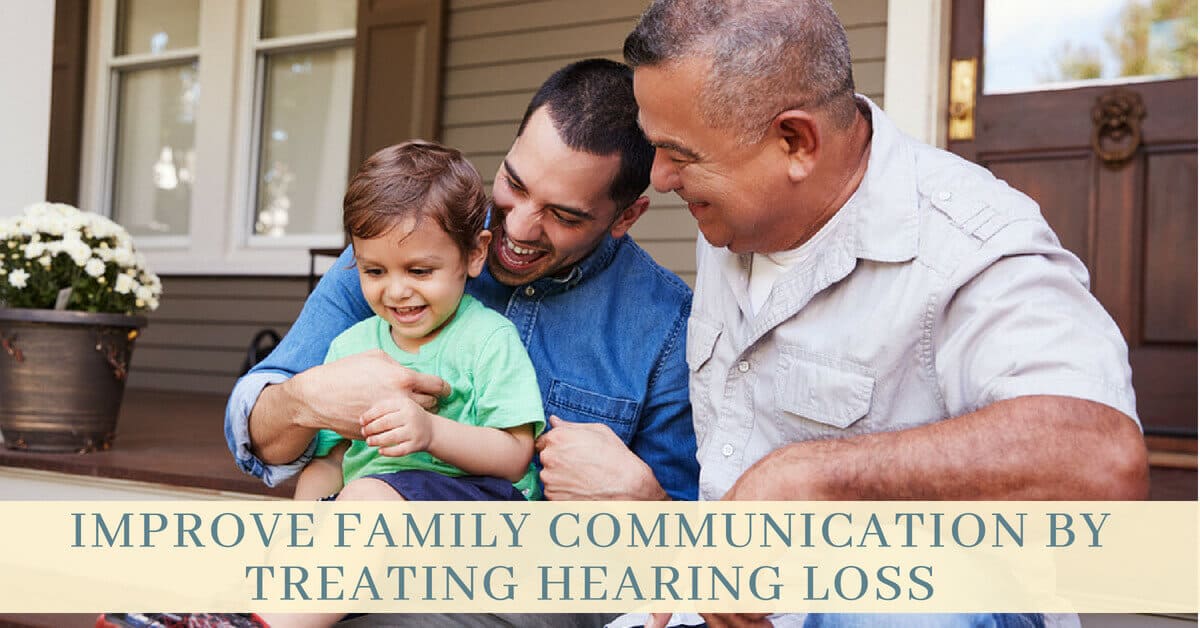Father’s Day is almost here, and you may already be combing department stores for that unique gift or planning a special outing to show your father how much he means to you. And whether he goes by Papa, Granddad or Grandpa, your grandfather is definitely also someone to celebrate on Father’s Day.
There’s no question that dads and granddads play a significant role in our lives, and spending time with them is a great way to show them how much we care. Whether you have tickets to a baseball game, or are planning a family barbeque, a nice meal out, or a day spent fishing at the lake, you are likely looking forward to the chance to catch up and connect. But what if your dad’s untreated hearing loss makes conversation difficult?
According to data from the National Institute on Deafness and Other Communication Disorders (NIDCD), one third of Americans between ages 65 and 74 and nearly half of those 75 or older have hearing loss. Although hearing aids have been proven to effectively treat hearing loss as well as provide a multitude of health benefits, many people who need them don’t wear them.
If your father hasn’t looked into treating his hearing loss, Father’s Day is a great time to lend your support and encourage him to visit a hearing care professional. Better hearing is a gift that can’t be wrapped, but it might end up meaning the most.
Here are just a few ways family communication could improve once your loved one starts wearing hearing aids:
-
Easier communication
It’s no secret that communication between family members suffers as a result of letting hearing loss go untreated. Hearing problems make it difficult to recognize and process speech, and the result is countless misunderstandings and frustrations that can cause resentment to grow.
Untreated hearing loss makes it difficult for family members to connect and enjoy each other’s company but hearing aids can help to re-establish those lines of communication, and with them, the intimacy, warmth and fun moments that tie families together. With hearing aids, we are able to catch every utterance, mumble and nuance of our family member’s words to be able to respond in more subtle ways.
-
Greater emotional stability (for everyone)
Untreated hearing loss has been linked with anxiety, depression, low self-esteem and a reduced sense of control over one’s life. Although these mental health symptoms take the biggest toll on the person living with hearing loss, they can also have a significant impact on that person’s family members. Happiness is contagious, and the mental health benefits of treating hearing loss have the potential to give the whole family a boost.
-
More enjoyable family get-togethers.
Family get togethers can get noisy, with alcohol and merriment usually involved. Those with hearing loss usually find it difficult to distinguish between different sounds in environments like these due to damage to the inner ear leading less clear sound. Whether your family loves bonding over movies, long conversations over dinner, barbeques at the park or board games, your special get-togethers will be even more enjoyable when your loved one is able to take part in the conversation.
Hearing aids have been proven to reduce listening effort significantly. Some devices can even tell the difference between background noise and voices, making it easier for the wearer to detect and respond to the inevitable light-hearted family banter you encounter round the dinner table. This means less stress and heightened rapport with the people you love.
-
Better conflict resolution
When conflicts do arise, as they do in every family, they will be much easier to work through with everyone able to hear and participate in conversation. But keep in mind that even with hearing aids, deciphering speech in background noise or while multiple people are talking can be difficult. Everyone in the family should be aware of simple communication strategies they can use to make listening easier for your family member with hearing loss.
-
Increase in brain health fights the threat of dementia.
You might not know this, but hearing is one of the most important ways the brain stays active throughout one’s life. If an older member of the family has hearing loss, the lack of audio signals leads to less brain stimulation, which can lead to dementia, cognitive decline and lower mental health. This can sever the lines of communication between them and the rest of the family.
Visit Us at Desert Valley Audiology
Once again, hearing aids can reduce these risks by providing exercise for these areas of the brain, helping the wearer to be more socially active and could help ward off the mental conditions that often plague family members as they get older. If you believe a loved one may be experiencing hearing loss, encourage them to reach out to us at Desert Valley Audiology. We provide comprehensive hearing tests and hearing aid fittings for the entire family.

